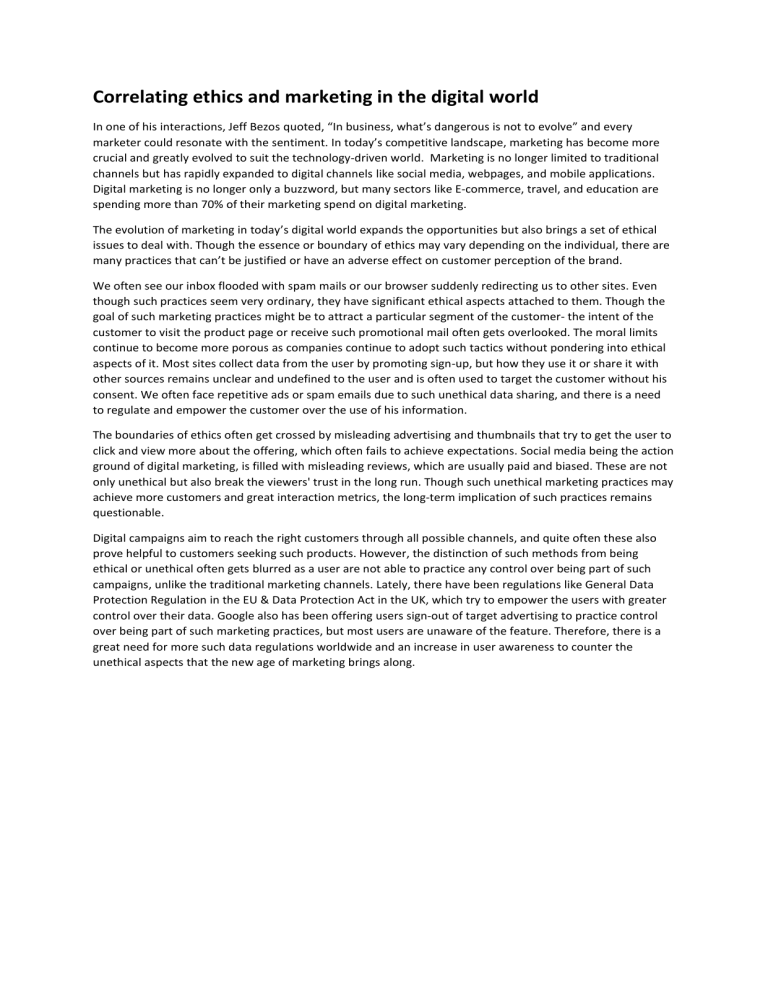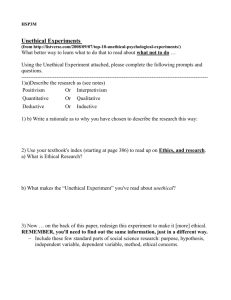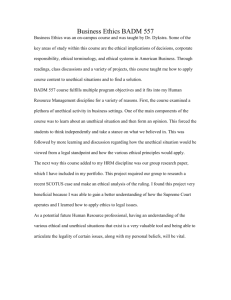
Correlating ethics and marketing in the digital world In one of his interactions, Jeff Bezos quoted, “In business, what’s dangerous is not to evolve” and every marketer could resonate with the sentiment. In today’s competitive landscape, marketing has become more crucial and greatly evolved to suit the technology-driven world. Marketing is no longer limited to traditional channels but has rapidly expanded to digital channels like social media, webpages, and mobile applications. Digital marketing is no longer only a buzzword, but many sectors like E-commerce, travel, and education are spending more than 70% of their marketing spend on digital marketing. The evolution of marketing in today’s digital world expands the opportunities but also brings a set of ethical issues to deal with. Though the essence or boundary of ethics may vary depending on the individual, there are many practices that can’t be justified or have an adverse effect on customer perception of the brand. We often see our inbox flooded with spam mails or our browser suddenly redirecting us to other sites. Even though such practices seem very ordinary, they have significant ethical aspects attached to them. Though the goal of such marketing practices might be to attract a particular segment of the customer- the intent of the customer to visit the product page or receive such promotional mail often gets overlooked. The moral limits continue to become more porous as companies continue to adopt such tactics without pondering into ethical aspects of it. Most sites collect data from the user by promoting sign-up, but how they use it or share it with other sources remains unclear and undefined to the user and is often used to target the customer without his consent. We often face repetitive ads or spam emails due to such unethical data sharing, and there is a need to regulate and empower the customer over the use of his information. The boundaries of ethics often get crossed by misleading advertising and thumbnails that try to get the user to click and view more about the offering, which often fails to achieve expectations. Social media being the action ground of digital marketing, is filled with misleading reviews, which are usually paid and biased. These are not only unethical but also break the viewers' trust in the long run. Though such unethical marketing practices may achieve more customers and great interaction metrics, the long-term implication of such practices remains questionable. Digital campaigns aim to reach the right customers through all possible channels, and quite often these also prove helpful to customers seeking such products. However, the distinction of such methods from being ethical or unethical often gets blurred as a user are not able to practice any control over being part of such campaigns, unlike the traditional marketing channels. Lately, there have been regulations like General Data Protection Regulation in the EU & Data Protection Act in the UK, which try to empower the users with greater control over their data. Google also has been offering users sign-out of target advertising to practice control over being part of such marketing practices, but most users are unaware of the feature. Therefore, there is a great need for more such data regulations worldwide and an increase in user awareness to counter the unethical aspects that the new age of marketing brings along. References for Data: https://www.statista.com/study/109621/digital-marketing-in-india/ https://www.statista.com/statistics/1303411/india-digital-marketing-spend-share-by-industry/ http://www.efos.unios.hr/poslovni-engleski-diplomski-4/wp-content/uploads/sites/368/2019/02/ROLE-OFETHICS-IN-DIGITAL-MARKETING.pdf




